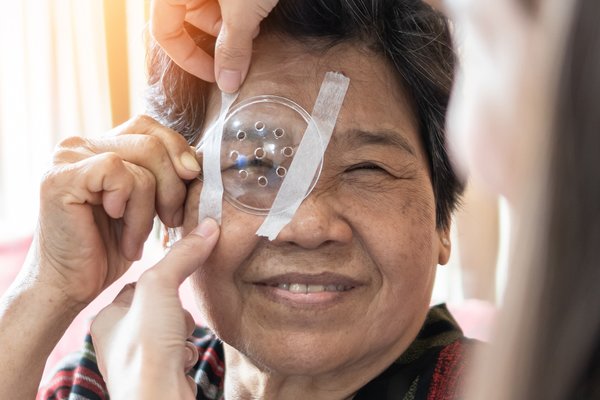Cataract surgery: frequently asked questions
An interview with Hendrik Boerman, productspecialist at OPHTEC by OPHTEC, 22 December 2019“Patients often tell me they wished they’d had it sooner. After all, cataract surgery improves their lives in many ways and patients don’t have to undergo surgery for it ever again."
Hendrik Boerman is Product Specialist at Ophtec. During his 23-year career at the company, he has gained a lot of knowledge from theory and practice, which he is currently transferring onto others in his lectures. He regularly receives questions from people about cataract surgery, which he answers below.
What type of lenses can I choose for cataract surgery?
Depending on a patient’s requirements, they can opt for lenses with different optical applications:
- Monofocal lens: This is a standard lens that is reimbursed by the health insurer. The lens is calculated to correct distance vision; people will still need reading glasses for near vision.
- Multifocal lens: This is a premium lens that is not reimbursed by the health insurer; patients have to pay extra for the procedure. The multifocal lens corrects both distance and near vision, so that patients no longer need glasses.
- Toric lens: This is a premium lens that is not reimbursed by the health insurer; patients have to pay extra for the procedure. A toric lens corrects astigmatism, a refractive error that causes blurred vision.
Why does vision improve after cataract surgery?
In cataract surgery, the clouded crystalline lens is removed and replaced by a new, clear lens. As a result, light can enter the eye again and the eye is again able to observe images.
Can cataract surgery correct astigmatism?
Yes, if a toric lens is implanted this will correct astigmatism. With astigmatism, there are two focal points, because the cornea is not round like a basketball, but has the shape of a rugby ball. Implantation of a toric lens will reduce these two focal points to a single focal point.
Can cataract surgery correct night-blindness?
Yes, conditions with low light levels will be greatly improved, and effects such as glare, halos and starbursts around lights will be significantly reduced.
Can cataract surgery correct myopia?
Yes, the lens can be calculated in such a way that it corrects myopia. However, the difference between both eyes cannot be more than 2.5 dioptre, as this can affect depth perception. This may mean that both eyes have to be operated on.
Can cataract surgery correct presbyopia?
Yes, the lens can be calculated in such a way that it corrects presbyopia. As with myopia, the difference between both eyes cannot be more than 2.5 dioptre, as this can affect depth perception.
Can cataract surgery remove floaters?
No, cataract surgery does not remove vitreous cloudiness. Floaters are age-related, but as they are inside the vitreous humour, they can only be removed by removing all the vitreous humour. This is a different kind of surgery.
Why do some people still need glasses after cataract surgery?
Doctors will, in consultation with the patient, seek to achieve emmetrope (0 dioptre), which means the patient will be able to see in the distance without glasses. If a monofocal lens is implanted during cataract surgery, the lens only has a single power and cannot focus on nearby objects. As a result, people with this type of lens will need to wear reading glasses for near vision.
With multifocal lenses, reading glasses are usually no longer necessary.
Why do some people still need laser treatment after cataract surgery?
When choosing the power of a lens, there will always be some degree of rounding off, even though all lenses have a dioptre tolerance. As a result, a slight refractive error may remain after surgery, just significant enough to require glasses. In that case, it might be worth considering treating the eye with a laser to correct any residual refractive error. It is, however, important to wait a while after surgery: as with a broken leg, your body needs six weeks to get used to the new situation. Only then will we draw up a treatment plan. Some people suffer from posterior capsular opacification after cataract surgery. This can be removed using a YAG laser.
What can I do if my vision is not really clear after lens replacement surgery?
If the outcome of surgery differs from the calculations that were made in advance, laser treatment may be applied to correct any residual refractive error.
Why do some people still have headaches after cataract surgery?
Some patients may suffer from headache after surgery; if the headache gets worse, they have to contact the ophthalmologist. It may be caused by increased pressure in the eye.
Can cataract surgery cause photosensitivity?
In people who used to suffer from cataract, the clouded lens stopped sunlight and artificial light from falling onto the retina. With the new, transparent lens, light again reaches the retina, which means they are more sensitive to light. It takes a few days to a week to get used to this. Patients can wear sunglasses or avoid the sun if they want. In extreme cases, it may take months to get used to the new situation.


